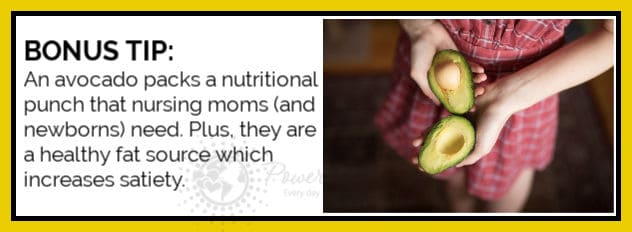Breastfeeding moms have an enormous responsibility–feeding their infant. Are you considering nursing your baby?
According to a study published in the Washington Post, the eighth-largest newspaper in the United States, there were more than 3.8 million babies born in America in 2017. And according to a separate study published by the CDC (Centers for Disease Control and Prevention), 8 in 10 mothers started breastfeeding their babies at birth.
Breast milk generally provides more nutritional value for newborns than baby formula. Therefore, new moms must consume a healthy, well-balanced diet. This practice nutrition ensures that those nutrients are passed on to their babies.
WHAT SHOULD NEW AND EXPECTANT MOMS KNOW ABOUT BREASTFEEDING?
Women who choose to breastfeed should know the foods that they will need to eat. And, more importantly, they’ll find a few that they will want to avoid. This diligence will ensure that their babies get the nutrients that they need.
In addition to being more discerning when it comes to food choices, they will also need to increase their calorie intake. According to a study published by the National Institute of Health, one of the world’s foremost medical research centers, women who choose to breastfeed will need to consume anywhere from 450 to 500 additional calories per day as this will enable them to secrete breast milk.
WHAT ARE THE BEST FOODS TO EAT WHILE BREASTFEEDING?
Having established the fact that new and expectant moms who plan to breastfeed will need to increase their calorie intake substantially and become even more discerning when it comes to their choice in foods, let’s take a moment to go over some of the foods that they should eat to improve their health and the health of their baby. First and foremost, they will want to be sure to consume enough of the following vitamins and nutrients:
- Vitamin A
- Vitamin D
- Calcium
- Vitamin E
- Vitamin B-12
- Potassium
While other vitamins and nutrients are also important, these are among the most essential when it comes to a healthy breastfeeding diet, according to most pediatricians and obstetricians. That said, let’s take a look at some of the foods that contain these vitamins and nutrients:
1 – SALMON
Similar to mackerel, herring, and sardines, salmon is a super fish that is chock-full of DHA (docosahexaenoic acid), a type of omega-3 fatty acid that can aid in the development of a baby’s nervous system. Studies show that DHA may also reduce a woman’s chances of developing postpartum depression. If you are a new or expectant mom who is considering breastfeeding and have concerns about the mercury in salmon, you will be happy to know that it contains less of the chemical element than most other fatty fish, including mackerel, herring, and sardines.
2 – LEAN BEEF
Lean beef contains vitamin B-12 and protein, both of which can provide you with the energy needed to handle challenges that come with being a new mother. It is worth noting that eggs, milk, and milk products are also excellent sources of vitamin B-12 and protein as well. According to a study published by the National Institute of Health, women who are nursing should aim for at least 25 grams of protein per day.
3 – LEGUMES
For women who are vegan or vegetarian, legumes are a great budget-friendly alternative to meat. And while they do not contain vitamin B-12, legumes, such as pinto beans, lentils, soybeans, and black beans, for example, are packed with protein and should be included in a well-rounded breastfeeding diet. To make up for the lost in vitamin B-12, women following a vegan or vegetarian diet should consider taking a multivitamin that contains between 2.6 to 2.8 mcg of the water-soluble vitamin. Some legumes also contain potassium, which can help enhance muscle strength and metabolism.
4 – BROWN RICE
Similar to protein, whole-grain carbohydrates can contribute to more energy and help keep you feeling satiated longer. Even more important, they can help you meet the higher calorie intake necessary to secrete breast milk. Along with brown rice, some of the best sources of whole-grain carbohydrates include oatmeal, barley, and whole-wheat pasta. Women who are breastfeeding should consume 3 or more servings of whole grains per day.
5 – BLUEBERRIES
Blueberries contain a host of vitamins and nutrients, such as beta-carotene, folate, choline, vitamins A and E, and manganese, which can all lead to better health for you and your baby. More than that, they contain antioxidants that may prevent disease according to a study published in the National Center for Complementary and Integrative Health, an open-access journal that publishes articles related to global health, maternal and child health, and nutrition. That said, women who are breastfeeding should aim for at least 2 servings of blueberries per day.
6 – ORANGES
Like blueberries, oranges contain antioxidants that can help prevent disease during infancy. However, they also contain vitamin C, which can increase the supply of milk in a woman’s breasts. More than that, vitamin C plays a critical role in the development of strong, healthy bones and teeth for both the mother and her baby. There is also evidence suggesting that vitamin C can even boost the immune system, making it possible for the mother and her baby to fight disease. In addition to oranges, vitamin C can be found in a variety of citrus fruits as well as bell peppers and tomatoes. A study published by the University of Maryland revealed that women who are breastfeeding should make it a point to consume at least 120 mg of vitamin C per day.
7 – EGGS
Consuming raw eggs is generally not recommended for breastfeeding mothers. However, cooked eggs are usually safe and offer a wide range of health benefits to both the mother and her baby. For example, eggs can help boost good cholesterol. And along with protein and healthy fats, they contain choline, a water-soluble vitamin-like essential nutrient that supports a variety of healthy bodily functions. Of course, the health benefits do not end there as eggs are chock-full of vitamins and nutrients. Some of which include the following:
- Vitamin A
- Vitamin B-12
- Zinc
- Vitamin B2
- Selenium
- Calcium
- Folate
- Phosphorous
Also, please note that the vitamins and nutrients in eggs can help lower the chances of developing severe vision problems, including cataracts and macular degeneration.
8 – WATER
Although not technically a food, women who are nursing should drink at least eight 8-ounce glasses of water each day. Along with burning more calories, studies show that women frequently become dehydrated while nursing their babies. Beyond that, drinking plenty of water helps flush toxins and other impurities from the body.
WHAT FOODS SHOULD YOU NOT INCLUDE IN A BREASTFEEDING DIET?
Admittedly, the list of foods that nursing women should avoid is much smaller compared to those that they are encouraged to eat. Nonetheless, women who are nursing should avoid the following:
1 – COFFEE
If you’re a nursing mother who enjoys coffee in the morning, you should avoid consuming more than 2 or 3 cups daily. That’s because caffeine can potentially lead to a decrease in your milk supply.
Furthermore, some anecdotal reports suggest that the caffeine in coffee can agitate your baby. Thus, it may cause them to cry more frequently and become overly fussy.
While we are on the topic, it is worth noting that several other drinks are high in caffeine as well. Of course, these include sodas and certain teas, for example. Therefore, you will want to minimize how many of these drinks you consume while nursing as well.
2 – ARTIFICIAL SWEETENERS
While nursing, it is also a good idea to limit or even avoid foods that contain artificial sweeteners, some of which include jams, jellies, baked goods, and certain candies, for example. A study published by the National Institute of Diabetes and Digestive and Kidney Diseases, a division of the United States National Institute of Health, revealed that consuming excessive amounts of artificial sweeteners, such as saccharin and sucralose, can potentially lead to the development of diabetes and may also decrease the liver’s capacity to remove toxins from the body.
3 – ALCOHOL
While consuming excessive amounts of alcohol is never a good idea, doing so while nursing can affect your baby. Therefore, if you choose to consume alcohol, you should limit your consumption to 1 or 2 occasional drinks. Even then, you will want to wait until the effects of alcohol have worn off before nursing your baby. That typically takes about 2 hours.
FINAL THOUGHTS ON A BALANCED BREASTFEEDING DIET
All in all, a healthy, well-balanced diet can be just as beneficial to a nursing mother as it is to her baby. So, if you’re a new or expectant mother who is considering nursing your baby, you’re encouraged to follow the tips outlined in this article. Finally, seek the advice of a licensed nutritionist, dietician, or physician.

















